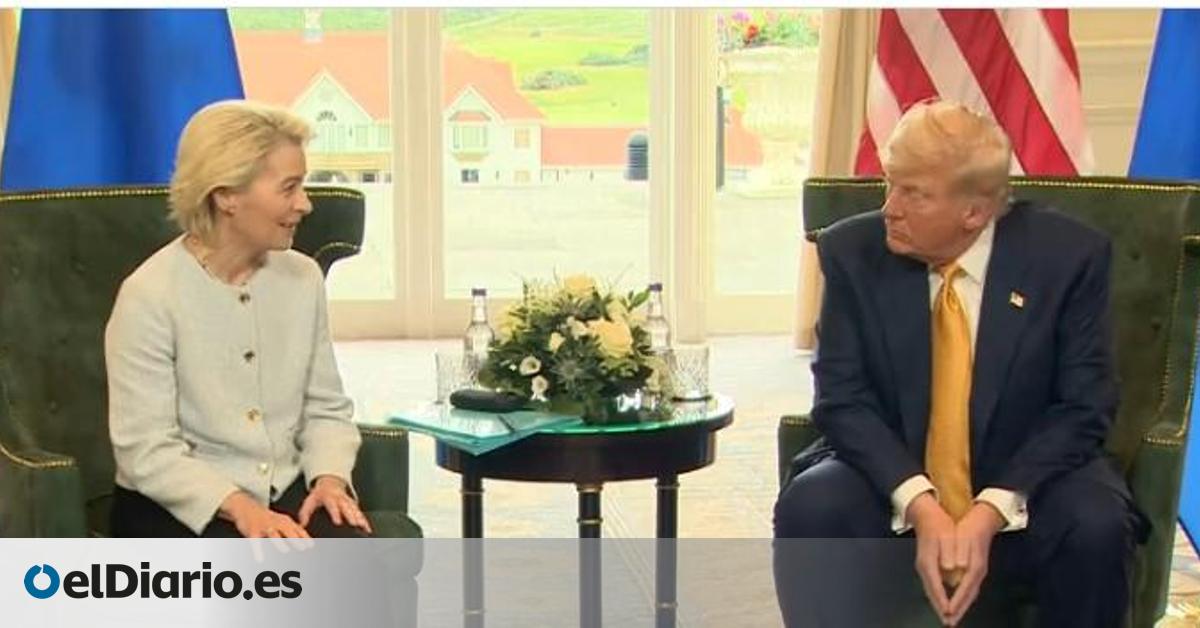
Donald Trump and the EU have closed an agreement on tariffs that will involve a 15% lien for most EUE exports to the US. The Covenant has been closed by the president of the European Commission, Ursula von der Leyen, and Trump, which has received it this Sunday in its Turnberry Golf complex (Scotland), which she traveled last Friday. Before gathering behind closed doors, the US president has taken the opportunity to launch reproaches to the EU and has reiterated that there is a “lack of equity.” When announcing the agreement, he said that the 27 will open to trade with the US with “zero tariffs” and that the EU has promised to increase investments in that country.
Trump has assured that the EU has promised to invest 600,000 million additional euros in the US and 750,000 million in the case of energy. This expense will occur in the next three years, as detailed later von der Leyen, which has justified it in the need to disconnect from Russian gas.
The US president has also celebrated that the EU will increase its purchases in the American arms industry, which was together with energy one of the demands behind the commercial war. “They have agreed to buy a lot of military team. We do not know what that figure is, but the good news is that we manufacture the best military team in the world,” he said before remembering the imposition to NATO to shoot military spending up to 5%. In fact, he has said that the EU is not the same as the Atlantic Alliance, but practically.
“We agree that the tariff for cars and everything else will be a single 15%tariff. So we have a 15%tariff,” Trump added. To that generic tariff we must add 50% for aluminum and steel, which the Republican leader has said that it will remain. In that 15% the car industry also enters, fundamental to Germany, which for weeks had an extra 25% tax.
“We have stabilized a single tariff type of 15% for the vast majority of EU exports. This type applies to most sectors, including cars, semiconductors and pharmaceutical products,” explained von der Leyen, which has mentioned the most relevant industries for Germany, Netherlands and Ireland, which were the countries to which they were most disturbed.
“This 15% is a maximum clear limit,” added von der Leyen, who has assured that there will be “zero tariffs for a series of strategic products”, among which has cited airplanes and their components (especially important for companies such as Airbus or Boeing), “certain chemical products, certain generic medicines, semiconductor equipment, certain agricultural products, natural resources and essential raw materials.”
The agreement involves maintaining more or less the tariffs that the US had been applying to the EU since Trump unleashed the commercial war since he imposed a generic 10% that joined the 4.8% average than previously existing. “In these turbulent times, this is necessary for our companies to plan and invest. We are guaranteeing an immediate reduction of tariff Framework from which we will further reduce tariffs on more products, we will address non -tariff barriers and cooperate in economic security, ”said the German.
“We have a commercial agreement between the two largest economies in the world, and it is a very important agreement. It is a huge agreement. It will contribute stability. It will provide predictability. That is very important for our companies on both sides of the Atlantic, they are 15% tariffs in all areas,” said von der Leyen, who has assured that it is a “good agreement”, despite the fact that it is a lien that was unthinkable at the beginning of the negotiations in April.
At that time, the 10% figure signed by the United Kingdom was unacceptable to the EU, where they assured that this rate “could not be the norm.” However, the pressure has been increasing in recent weeks as the limit initially given for negotiation was approaching. When in the EU they were confident in reaching an agreement in early July, Trump threatened with a 30% general tariff that in Brussels have described as “prohibitive.”
Throughout this time, the EU has left Trump’s blows unanswered, which had already applied a generic tax of 10% so he considers a “reciprocal tariff” to compensate for issues such as VAT, which support all transactions and not only imports in the EU, as well as 50% to aluminum and steel that, Trump said, will be maintained with the agreement.
What the EU has to answer now is whether it accepts the agreement as Trump has raised or if it introduces any type of countermelted. When the US began to apply 25% to steel and aluminum, an response package was prepared for a value of 21,000 million euros. That list was now joined to the second package of countermeasures, valued at 72,000 million euros. In principle, they were going to activate in the event that the negotiation jumped through the air and Trump fulfilled its new threat of applying 30%tariffs, but in the European Commission they have left without answering for now if some type of tax would be applied in case Trump kept the rates already applied.
Source: www.eldiario.es

